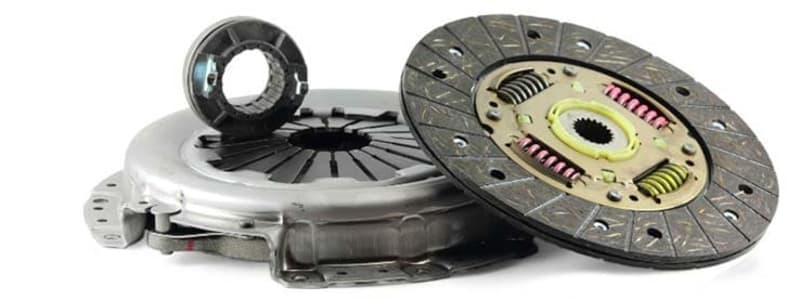You’re driving down the road, feeling confident and in control. Suddenly, your car starts to act strange. You press the gas pedal, but nothing happens. You try to shift gears, but the transmission feels disconnected. The engine revs, but the car doesn’t go anywhere. Panic starts to set in, and you realize your clutch pedal has gone all the way to the floor.

Image: www.autobutler.co.uk
This terrifying scenario is unfortunately a common experience for many drivers. But don’t worry, it doesn’t necessarily mean your car is doomed. Understanding what causes this issue, how to handle it, and what options you have can make a stressful situation less daunting.
Understanding the Clutch and Why It Fails
The clutch is a vital component in a manual transmission car. Its primary role is to disconnect the engine from the transmission, allowing you to shift gears smoothly. When you press the clutch pedal down, it engages a hydraulic system that separates the clutch disc from the flywheel. This break allows the transmission to shift without grinding or damage.
A clutch pedal going all the way to the floor is a serious problem, often indicating a failure in the clutch system. The most common culprit is the clutch master cylinder. This component, located near the brake pedal, controls the hydraulic pressure that operates the clutch. When the master cylinder fails, it can cause fluid leaks, diminishing pressure and causing the pedal to go all the way to the floor.
Common Causes of a Clutch Pedal Going to the Floor
While a faulty master cylinder is a common cause, there are several other reasons why your clutch pedal might suddenly go down:
- Clutch Slave Cylinder Failure: This component is located within the transmission housing and directly connects to the clutch assembly. A leaking slave cylinder can also lead to a loss of hydraulic pressure.
- Clutch Disc Wear: Over time, the clutch disc, which connects the engine to the transmission, can wear down. If the disc is worn too thin, it can slip and prevent proper engagement of the clutch.
- Hydraulic Line Leak: The lines carrying hydraulic fluid to the slave cylinder can develop leaks, leading to a loss of pressure.
- Clutch Cable Issues: In some older vehicles, a clutch cable, instead of hydraulics, connects the pedal to the clutch assembly. A broken or frayed cable can prevent the clutch from engaging correctly.
What to Do When Your Clutch Pedal Goes to the Floor
If your clutch pedal goes all the way to the floor, stay calm and follow these steps:
- Pull over safely: Find a safe spot, away from traffic, to stop your vehicle. Safety is paramount.
- Shift into Neutral: If possible, shift into neutral to prevent the transmission from being damaged and to allow you to coast to a stop if necessary.
- Contact a tow truck: Call a tow truck to take your car to a mechanic. Driving with a failed clutch is extremely dangerous and can damage your transmission.

Image: www.2carpros.com
Avoiding a Clutch Failure
While you can’t completely prevent a clutch from failing, there are some steps you can take to extend its lifespan:
- Regular Maintenance: Get your car’s clutch inspected regularly by a mechanic. This can help catch potential problems early on, making repairs less expensive.
- Proper Shifting Techniques: Shifting gears smoothly and avoiding harsh shifts can reduce wear and tear on the clutch.
- Don’t Ride the Clutch: Holding the clutch pedal down for extended periods of time puts extra stress on the clutch system.
Expert Advice
If you’re experiencing any signs of clutch failure, such as slipping, shuddering, or a loss of pedal feel, it’s essential to address the issue immediately. Ignoring a problem can lead to more severe damage and expensive repairs.
When choosing a mechanic, look for one who specializes in clutch repairs and has a good reputation. Ask for a quote before any work is done and get details about the parts being used and labor costs.
Frequently Asked Questions (FAQ)
Q: Is it safe to drive a car with a failed clutch?
A: No, it’s very unsafe. The car will be difficult to control, and shifting gears can become impossible. You risk damaging the transmission if you continue to drive.
Q: Can I replace the clutch myself?
A: While possible, replacing a clutch is a complex and challenging task. It requires specialized tools and knowledge. It’s generally recommended to take it to a professional mechanic.
Q: How much does a clutch replacement cost?
A: The cost of a clutch replacement varies depending on the vehicle make and model, as well as the mechanic’s labor rates. You can expect to pay anywhere from a few hundred dollars to several thousand dollars.
Clutch Goes All The Way To The Floor
Conclusion
A clutch pedal going all the way to the floor is a serious issue that requires immediate attention. Understanding the causes, what to do when it happens, and how to prevent it can save you from stress, potential damage, and costly repairs. If you ever find yourself in this situation, remember to stay calm, pull over safely, and call for professional help.
Are you interested in learning more about how to maintain your car’s clutch? Let me know in the comments below!





